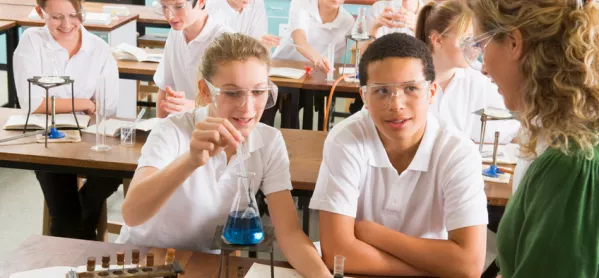The value of practical activities in science lessons is hotly debated, particularly on the new GCSE and A-level courses.
With increased content (and maths) to cover, simply teaching students to answer the “practical” questions on the exam can be done faster on paper. By explaining an experiment and the key errors, they are then free to get on with past-paper questions and nailing the exam criteria…
…But it’s practical work that makes science not only distinctive, but fun.
And for that, we need to not only make sure we don’t give up on practical work completely, but ensure that the practicals we do will lead to really high-quality student thinking.
We need to allow students to link between the “domain of observables” and the “domain of ideas”; one of the best times to do this is at the very beginning of your lesson.
These quick pre-lab activities will set the tone for the thinking that you want them to do during the practical:
- Jumble up the method into the wrong order for students to unscramble.
- Provide an empty box next to each step in the method for students to draw in the diagram.
- Supply a range of diagrams from which students select the correct one for each stage of their method (this works really well for circuit diagrams).
- Give students the aim, and then provide different outline methods so they can select the method that best answers the research question.
If you’ve got more planning time on your hands, the following suggestions are both absolutely worth it:
- Using “crucial experiments” for learning new theories:
Set up the experiment as a means of distinguishing between two competing scientific theories. Students should compare the theories and predict what they’ll observe. Concept cartoons are ideal for scaffolding this kind of student thinking. Students engage in the domain of ideas (which theory they think is best), and make predictions in the domain of observables (what they think will happen). Then, during the experiment, the observations students make instantly get them thinking about the scientific ideas they started with, making the practical a really productive learning experience.
- Interrogating the method to enhance practical skills:
Ask students questions in pre-practical that require them to think clearly about how they are going to carry out each step of the experiment. For example, what are the potential hazards in this step? How will you account for them? What are the sources of error in this step? How will you ensure your results are accurate? How long will this step take? Is there anything else you could be doing to ensure you are ready for later steps/have cleared up earlier steps?
This makes a great homework task before the lesson. You can start the practical promptly, knowing that the students will not need as much low-level intervention, leaving you free to engage students in higher-order dialogue during the experiment.
There’s no reason why increased “rigour” in the new courses should mean less practical. But, we should evaluate how effective our current practice is and put student learning at the heart of planning for practical teaching.
Emily Seeber is head of science at Bedales School in Hampshire. She writes the Seeber’s Science column fortnightly. If you would like her to look into any classroom problems that can be answered through science, leave a comment under the article





